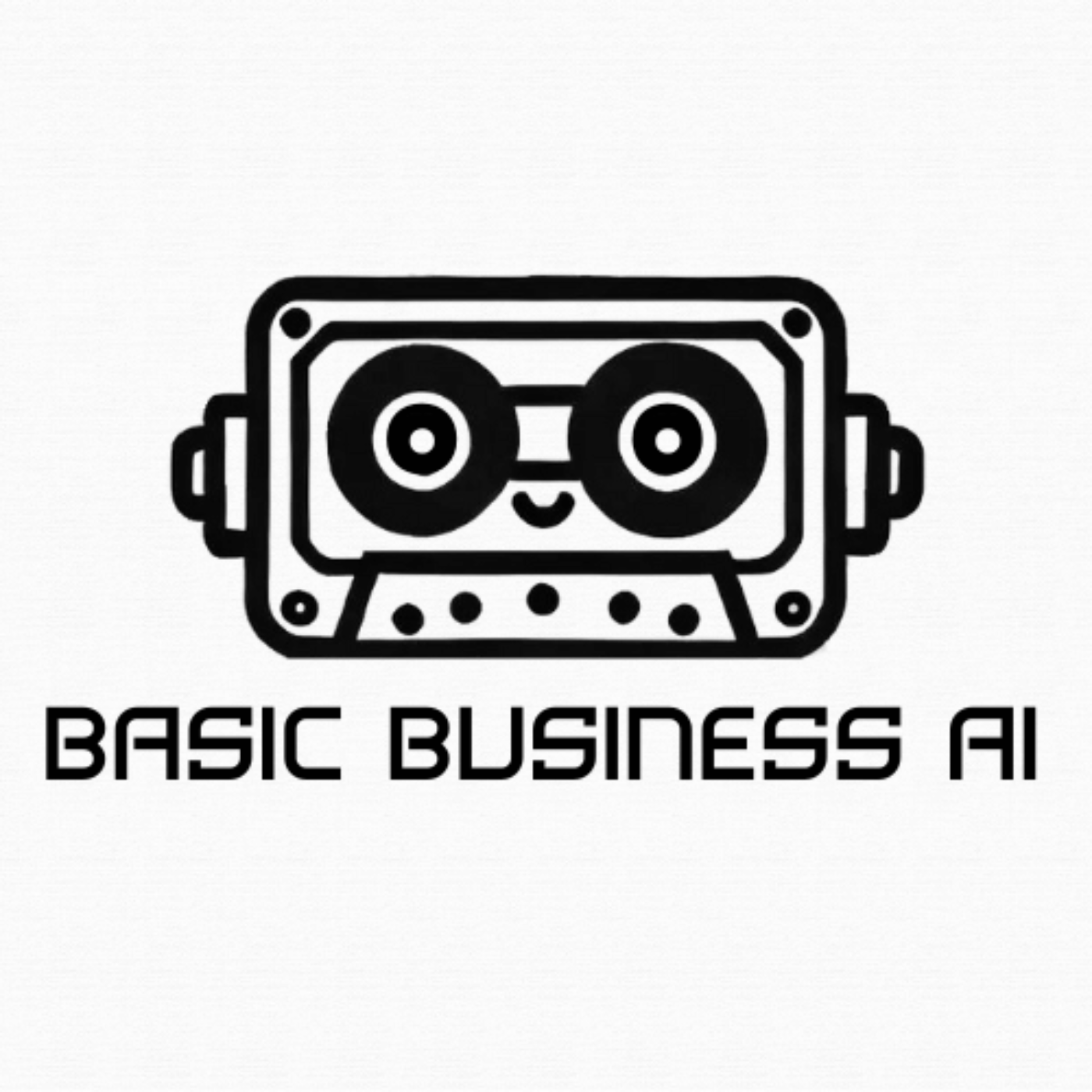Episode Transcript
[00:00:03] Speaker A: Welcome to Basic Business AI, a podcast dedicated to simple AI strategies for businesses who don't want to get an advanced tech degree or hire some marketing bro. I'm your host, Ana Gonzalez, and you can find me on social media. At Anabotprime, we bring in regular business owners like you and me to discuss practical strategies, ideas, and perspectives about AI without getting too far into the weeds of the tech BB. AI is sponsored by Anabots. Get a trained AI sales and support assistant to work 24/7 that increases sales, reduces costs, and frees up your time so you can focus on growing your business. No tech skills needed, and you can get started in less than ten minutes. Go to Annabutz AI to learn more. Once more, that's Annabots AI.
Today's guest is John Perrell.
John Perrell is a transnational transformational coach who uses AI extensively to build his business. He is delivering social media management, utilizing AI to make marketing easier and more focused so coaches can focus on that way they do.
Can focus on what they do well.
So, John, welcome to basic business AI.
[00:01:14] Speaker B: Thank you.
That was a great intro because it's so hard today, just in the last week, to tell if the person on the screen is an animation or the real person.
Oh, yes, you're the real person, because you haven't cut out all the. All the. All the hiccups, which is great. It's original.
[00:01:33] Speaker A: I mean, yes, but, yeah, no, I'm very real. So, from your perspective, John, how is AI reshaping the future of your industry?
[00:01:48] Speaker B: AI is reshaping the world, not just my industry. It really depends on what industry you're in, as to how it's going to reshape your industry. I was listening to somebody the other day, there's that phrase out now. You won't be replaced by AI. You'll be replaced by somebody using AI.
What does that mean? But it's come home more recently that AI is going to start doing the entry level jobs across the board in anything, whether it's law or, you know, waiting, Uber. Uber eats or whatever.
My particular industry as a coach, it allows me. And again, it depends on how well you're using it and how you're utilizing it, because it's at all. It's just like the printed wear, the newspaper decades ago. Depends how you use it. I use it to free up my. My time so that I can actually concentrate on what I deliver, which is the relationship with. With the client, with the group that I'm talking to.
I try.
I don't deliver off a script. From AI. I use it to give me points and then I make mistakes, you know, in hiccups and lose my train of thought and get told I'm going to talk for 15 minutes and talk for an hour.
AI wouldn't do that. It's sort of, it's too structured, so it allows me to free up in my particular industry, coaching, training. It's about the relationship and AI doesn't as yet have that, that relationship, that emotional connection.
It's still very technically based.
[00:03:31] Speaker A: Yes. I think you touch a very important, well, you touch very, a couple of very important points, but the last one that you made about AI does not have that emotional touch. Like AI can kind of know the sentiment of the conversation. It can kind of know, oh, this person is upset or, oh, this person sounds happy. I'm going to respond accordingly. But the connection is not there. It still feels cold.
[00:04:04] Speaker B: It's changing, really. I do a looping training program. It's a six week program, so we meet live calls once a week. And last count there was 11,000 prompts on the website. Great course costs $500. I've seen other courses for thousands of dollars that are worth half as much. But anyway, what's happened with this week's six week course is it's a revolving course. You do one six week and that's it. You know, you've done the course. No, it updates and it keeps changing. And it was changing so fast. It slowed down a bit now, but literally every week now there's something like, wow. And this week I'm learning about emotion and sentiment and how AI is now starting to understand more depth about emotional reactions in its emotional response and sentiment and that sort of thing. If I'm writing a, if I'm writing a prompt for a CVD, I'll put in some emotional tags into that prompt. So that gives me a more emotive cv that I can send off to a prospective, prospective employer. It's moving really fast. But there is still that coaches, now you can go on, you can get an AI bot that'll be a coach and you can be coached by an AI. But really that's just a series of couple of dozen questions and very directional. It just lacks that connection. But then also that puts the onus back on the coach to be able to deliver at that empathic, empathetic level of awareness, sensory acuity. I call it being able to pick up on the client's reactions. So you have so many. So your reaction at the moment is you have. So I'm hallucinating I'm guessing you have so many thoughts going on that you're struggling to pick up. What am I going to ask John next?
[00:06:00] Speaker A: You are right. Like, sometimes my ideas are just, like, going around. I'm like, oh, my gosh, I have so many ideas. Which one should I say first?
[00:06:08] Speaker B: But, yeah, I couldn't do that.
[00:06:11] Speaker A: Yeah.
What I like about AI is, you know, brainstorming, like, with the sentiment that you're actually, a couple of weeks ago, I found a platform that tells you, based on the reactions of the people on your post, tells you what would be a good type of content next, based on your previous post and the people's reactions with the emojis.
And I thought that was pretty interesting, but still not there yet to, you know, go as a human being, as a creative human being, and analyze and be like, oh, all right, this is what's going on. This is what's going to happen next from me to that other person. So, yes, the entry level. Entry level jobs are going to get taken over by AI.
Still, there will be a human that needs to monitor them.
But I think it's.
Yes.
[00:07:21] Speaker B: Human in the loop.
[00:07:22] Speaker A: Yes, exactly. But I think that we are now going into it, we're evolving into higher level tasks. Like now the entry level jobs are being mostly done, mostly automated, and then those people who were doing them are having to evolve into something at a higher level, you know?
[00:07:48] Speaker B: Yeah, no, no, that's exactly right. So an illegal company, the paralegals that used to go away and sort of pull the cases out and put the cases, that's all done by AI now. So the lawyer has to be more switched on to be able to pull that information together and create some understanding out of it. I, Elon Musk said a little while ago, if AI was in the 16th century, it would be telling you that the earth is flat.
AI can't see the future. It's dealing with what it knows, what it's got, what's historical. So the challenge there is how does that lawyer gain the experience to pull that information together? Normally in a trade, like being a lawyer or, I mean, even being a chef, it's the same. You've got to, you know, clean the pots and scrub the pans to understand, okay, if I scrub the pot with stainless steel or stainless steel or wire, the taste changes or the quality of the foods changes because it sticks to the pan differently.
[00:08:45] Speaker A: Yeah.
[00:08:46] Speaker B: Trainer, that trainer, entry level jobs going, they won't get that space to do that. So it's a, it's an interesting conundrum that AI is presenting to us.
I don't know.
People are going to become more generalist. It won't be very long. Within our generation, when people are mostly self employed, they reckon in America, 2030, 70% of the population will be self employed.
And previously, historically, we were trained through the education system to do one thing pretty much like a slave. That won't exist.
When AI starts to really become a force, we'll have to be generalist, we'll have to pull different things from different areas, and that's experience.
How do you get experience?
It's an exciting time we live in. It's really. I wish I was young, I wish I was your age so I could spend so many more decades and being involved in it. I'm excited. It's really good. It's got its downsides, AI, for sure.
[00:09:50] Speaker A: Like everything.
[00:09:52] Speaker B: Everything has. Absolutely, absolutely. But I'm looking at the sort of what it can do for everybody. It's that train, you know, it hasn't left the station yet, but you still make, you still better. Make sure you're on it. It does leave the station. You'll be left behind.
[00:10:07] Speaker A: Yes, it is a very exciting time, for sure. And I like what you said, being left behind. We just need to make sure that we're not being left behind. And I think it happens with every revolution, every new revolution, every new thing that happens. It happened when cars started to be a thing, it happened with Internet started to be a thing, it happened to cell phones, started to be a thing, and now we have cars who use Internet and cell phones and now AI. I think it's the next thing. And I'm very excited to see where we're going to be at in ten years from now. And it's evolving so fast that I'm excited to see where we're going to be at in a year from now.
[00:10:54] Speaker B: We definitely won't be in the same place. It'll be a very different place in five years. I think you said revolution. I think that's what's happening. This is way bigger than they used to say. It was as big as the printing press, but I think it's going to be bigger.
You have a mass of the population. It's the first time in history that everybody in the world has access to all the education in the world.
[00:11:16] Speaker A: Oh, my God.
[00:11:17] Speaker B: Yes, I've got a friend, she's Burmese. She's like, where can I. Where? She's in the Middle east. Where can I get. Where can I learn Spanish? I need to learn Spanish and help me in my job. And I said, just go on, AI. I don't know how to do that. Just have to learn how to do the prompts. And you better speak Spanish or French or whatever other language you want to learn. You don't have to go to school. I think the two biggest things I see dropping away are translators.
I'm on a course at the moment where the guys delivering it real time in English and I can log on in five languages. Real time, yes. And education. If I want to go out and learn about mountain climbing, I can go and join a club and I can do mountain climbing. I could take a year or two or I can go on AI. I can learn the rudimentaries and learn the skills and then go to the mountain climb. And actually I've sort of jumped the trainee stage. I've jumped in with the bit, gotta be a bit careful. You don't sort of, you don't sort of make mistakes, but you can learn anything on the Internet.
[00:12:20] Speaker A: Yes, yes. I was, I was talking to someone not too long ago and I mean, John, I have this obsession for learning. Like it's, it's.
I don't even know how to describe it. It's an obsession. And now with AI, I've been able to learn more and faster and I am so delighted with that just because you mentioned that. But tell me who you serve and how can people reach out to you?
[00:12:51] Speaker B: I have a podcast. It's called shining Light on shadows on YouTube. So if you put in shadow work or shining light on shadows, you can find me on YouTube. It goes out once a week and I'm working through a syllabus.
Shadows are the things that have happened to us usually in our early life in a child. So our early, early life that we've suppressed, we deny. But they've created the character that I am, they've created me for my good points and my bad points. And most of the things that I do, we do unconsciously, we don't think about them, we behave the client, the person is not their behavior. There are mass of their experiences. Most of them are suppressed. And these are our shadows.
And I. The challenge, of course, is that these shadows create this dis ease.
And, you know, we're not ready for change.
And it took years, decades and decades and decades for the sort of the move from the horse to the cart to the car. AI is changing. It's a revolution. It is changing so fast.
The biggest problem that people are having now, mental health issues, mental issues, they're not comfortable with the change. It's happening too fast.
And what happens is they behave, they react. We look at what's happening in the world today.
I spent ten years in Asia and I come back to the UK, to Britain, and these signs in the shop window saying, don't abuse our staff. And I'm thinking, what the heck's going on here? How could we abuse the staff? And it's because people are just so, they're not feeling heard, so they're reacting, their emotions are coming up. You know, Covid's sort of amplified that.
And all those shadows, those behaviors that have held us back, those dis. Eases, those uncomfortable things that come up for us, cause these negative reactions, so we abuse the shop stuff.
So I work with people, groups, clients, to actually start to reflect on what it is, why that emotion came up instead of behaving. Notice the emotions come up.
How could just by noticing the emotions come up? Just by you starting to reflect on the fact that you've got all these ideas flying around and you're showing them, your behavior is showing me all these ideas flying around. If you settle down. Do you meditate, Anna?
[00:15:18] Speaker A: I do sometimes. I don't. I have not done it in maybe two months.
[00:15:25] Speaker B: I do it every day.
[00:15:26] Speaker A: Oh, that's awesome. Thanks for the reminder.
[00:15:29] Speaker B: If you slow down and meditation is good and it's really important today because it allows the mind to start to think instead of bouncing from one thing to the other. So you're all over the place and that's your energy and it's spiky and you're going to attract people in relationships that are like. Then there's going to be difficult relationships. You're not going to be comfortable in this situation just because you're, you're racing, you're trying to catch the train and it's already sort of halfway down the platform.
But to slow down, meditation is a great way to do it, to slow down. We have to accept that some of these things, some of our shadows, some of the challenges that we have, the pains that we have, the pressures we have, they're going to come up.
And I don't use AI to do that. I do that myself. I use AI to connect with the right clients. So I put myself out there. People go, I'm interested in what John's saying. Yeah, let's sort of watch a couple of the videos or let's have a chat to him, see what he's doing, and if it resonates, great. Then I work with people one to one or in groups.
[00:16:35] Speaker A: That's awesome.
[00:16:37] Speaker B: That's what I do.
[00:16:38] Speaker A: Yeah, that's awesome. Well, thank you for that. We're going to wrap from here. Thanks to our guest Jean Farrell, for joining us for a practical conversation about AI and its potential for business. You can learn more about what he does by visiting Shining Light on Shadows podcast on YouTube. Is that correct?
[00:16:53] Speaker B: That's it, yep. Shining light on Shadows.
[00:16:56] Speaker A: Great. If you're in a business of any size and you have some ideas or strategies around the topic of AI, we'd love to have you in a future episode as well. We interview business owners of all levels of experience and exposure to AI so we can represent all voices, especially the 80% to 90% of us who are curious about AIH, not trying to be the tech geniuses. Apply for a future episode by going to basicbusinessai.com. and one more time, if you want to install a sales and support team for less than 10% of the cost of a single employee, get yourself an anabot. Learn more at anabouts AI. See you next time on basic Business AI. Oh, and by the way, if you liked this episode, tell your friends. See you later.
[00:17:37] Speaker B: Thanks, Anna.



